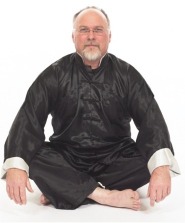Over the years I have from time to time noticed changes in the way my body moves – recently I have noticed some small changes. Interestingly these changes have begun with very small perturbations in existing patterns – so small I could not properly describe them until a while later after more relaxed practice when they have grown bigger and more defined.
They are initially so small and undefined that it is often not even clear if they are a fault or an improvement until they have grown naturally into an extension of the basic pattern.
I suspect the same is true of other types of behavioural change where the new is developed “underneath” the old habitual pattern before it emerges and eventually replaces it.
Tai Chi vs Zumba
13/10/2018Classes at half term
13/10/2018Don’t expect praise in a Tai Chi class!
12/10/2018I have noticed many cultural differences between studying Tai Chi in the east and in the west – perhaps the most difficult for beginners to understand is the completely different approach to the relationship of teacher to student – a good example is the lack of praise – westerners like to be told they are doing things right as with for hand positions – and if they do not receive this praise they can often become confused and even resentful – but this sort of ego reinforcement can actually be counter productive since it leads the student to focus on “doing it right” or doing more of the “right thing” thinking perhaps that more is better, actually to completely misunderstand what they are being praised for – in other words leading them to trying too hard in the wrong direction and not paying attention to their movement itself. So in this case praise maybe motivational but often to do completely the wrong thing and so is generally detrimental to the learning process.
In my experience the most a good Tai Chi teacher will risk is the occasional “quite good” in a vague sort of way, maybe once in 5 years – you will know when it is right and learning how to know for yourself is absolutely essential – a teacher can correct and introduce new exercise experiences but reinforcing bad old habits of ego driven body usage is not good Tai Chi or good teaching.
So perhaps the first hurdle in learning Tai Chi is learning how to learn and not to demand that Tai Chi is exactly the same as everything else – if it were then it would not be worth doing.
Tai Chi Residential at Belsey Bridge
18/09/2018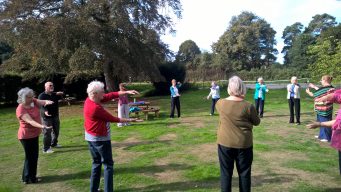
We had fabulous weather this year for our annual residential at Belsey Bridge near Bungay with everybody practicing hard and enjoying themselves in sunshine for the whole weekend. Food, as ever was brilliant and we had the pleasure of meeting the Norwich 76 Textile Group who produced some wonderful embroidery, rust dying and tie dying as well as being good company.
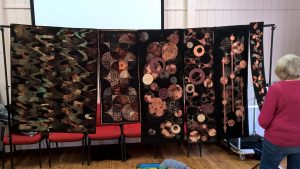 Sunday morning they joined us on the lawn for a little bit of loosening and warm up including cloud hands/silk reeling and Tai Chi walking.
Sunday morning they joined us on the lawn for a little bit of loosening and warm up including cloud hands/silk reeling and Tai Chi walking. 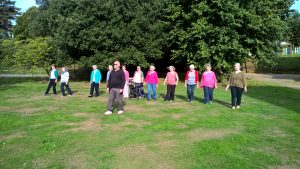
For the main sessions we did mainly Laojia corrections with some Broadsword and partner work which led into single and double push hands. For beginners the sword and partner work were completely new “tasters” but they applied themselves with good humour and we all thoroughly enjoyed ourselves.
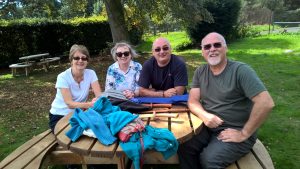
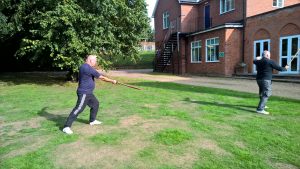
I have learned through painful experience that partner work and physical corrections make up a potentially very sensitive subject – martial arts people will probably wonder why I am bothering to write about this at all – whereas beginners or people with no experience of interpersonal physical activity may well recoil that I even dream of writing about it – let alone speak of it as normal, when they may well find the prospect completely frightening, foreign, unnecessary, invasive and more – especially if it involves touch across the gender line. If that is you please bear with me and understand that this is one of those deeply personal subjects that spans very divergent extremes.
You may be someone who emotionally or for religious reasons avoids interpersonal contact completely – or you may be a martial artist or sports person into wrestling, dancing or similar, to whom close/intimate contact with strangers is normal, necessary and an important learning tool. So this piece is intended to address those people more toward the avoiding end of the spectrum with the hope that you may be somewhat reassured and perhaps even encouraged.
Humans are a social species with close personal contact ingrained in our psyche from ancient ancestral grooming and physical closeness in communal living. This is something our modern society has led us to draw away from in recent generations. It is also something associated with our vulnerability and our sexuality – so today many of us do not comfortably interact with close touch especially with strangers in public even in a relatively controlled group environment. Nonetheless when we see a child or adult crying (especially close family or friend) our first, and natural response is usually to make some sort of physical contact – maybe to hug, kiss or massage it better.
We need to remember our ancestral roots and the physical communication that is such a fundamental part of our species existence. Interestingly once people cross that intellectual fear barrier they generally become quite comfortable with partner work and physical correction – as they come to understand it’s benefits and how physical interaction forms an essential part of the healing and learning processes – especially with an internal art such as Tai Chi.
Personally I was brought up in a family both distant and smothering derived from post Victorian parenting – which led to a very conflicted view of this subject, but now with the perspective of martial arts training since 1971 it is really not a problem, except in judging and dealing with the extent to which students – especially female beginners – are comfortable with this vitally important aspect of Tai Chi. Issues of pain, responsibility, respect, appropriateness and intimidation are replaced by the benefits of enhanced awareness, clearer understanding, easier trust on many levels, the use of pain signals in learning and healing as well as an appreciation of how physical communication can enhance relationships by grounding and bonding the partners
Not only is touch an extremely quick way to communicate, it is also a very reliable way that can communicate many things words are completely incapable of conveying – we should remember that words after all only make up 30% of communication – visually physical and tonal voice cues generally make up the remaining 70% – until we factor in touch which often overrides all the rest – try closing your eyes and moving around a bit. It is difficult to lie with touch or physical expression, whereas words and intellectual models are not only inaccurate but make lying easy and common.
Clearly this is a much bigger subject than a few martial artists training together – if you do not include partner work in your training you will be missing out on the very core of Tai Chi and risk being blinded by lack of understanding that goes with the un-knowingness of simply not having the experience. Fears are involved here so I would strongly urge Tai Chi practitioners – actually probably everybody – to look at what is stopping them from dealing with them. If you choose not to that is fine – it is your choice, but in my view a severley limiting one.
Tai Chi Retreat Sept 14-16th
23/07/2018
Once again we will be holding our annual Tai Chi Retreat at Belsey Bridge on the Suffolk/Norfolk border near Bungay to enjoy a quiet weekend of practice and conviviality – if you would like to join us please contact me on 07860 218334 or e-mail [email protected] – rooms are en-suite with full board and a weekend of instruction is included at £290.
2018 Shefford Tai Chi Festival review – World Health Organisation World Tai Chi and Chi Kung Day.
30/04/2018
We had a brilliant day again this year – despite the weather many more people came than last year and lots stayed for the whole day – we were delighted to see everybody. There was a lot of interest in all the classes starting with Tai Chi exercises to loosen up the body and a seated Zen meditation session to calm and connect both mind and body.
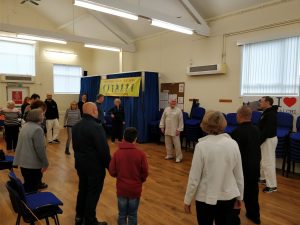
Shefford Tai Chi demonstration
The first guest presentation was from the ENSO Jujitsu group based in Clifton and headed by Lee Alexander, who showed us a variety of exercises and self-defence techniques with flowing movement and exciting throws including a female student taking on a series of attacks from the rest of the class. Visitors were encouraged to join in some partner work and experience the effectiveness of Jujitsu for themselves. There was a lot of enthusiasm and some laughter as everybody worked together co-operatively to learn these techniques.
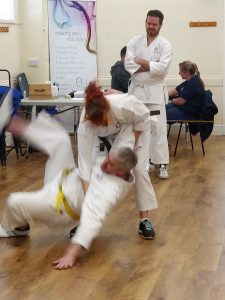
Jujitsu demonstration
Ian Deavin then took a beginners Tai Chi class incorporating standing exercises and slow walking – the sort of activities that the Monday afternoon and Sunday evening classes regularly use to develop relaxation, balance and mobility and which are excellent for falls prevention in people over 50.
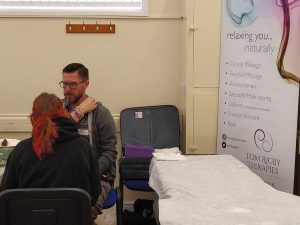
Massage and Aromatherapy consultation
By this point in the day the hall was quite full with many people sitting or standing with tea and cake while they appreciated the activities in the display area. Visitors were also able to visit the presentation booths for Massage/Aromatherapy with Tom Rigby who was giving free tasters all day and to discuss reading matter with Joy Lakin from Shefford Library, who presented a selection of books related to the day’s activities – and lending them out to visitors who had their library cards with them.
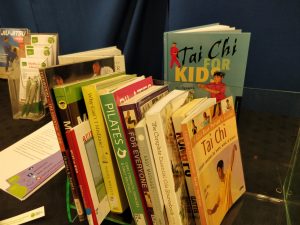
Shefford Library presentation
Ian’s original and inspiring Alexander Technique teacher – Eileen Johnson took a group through postural work addressing their primary control of the head and neck leading to relaxed posture and use of the body. Eileen used hands-on touch to adjust each person – and the group was encouraged to adjust their own posture in simple movement.
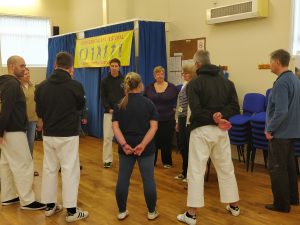
Group doing Alexander Technique
More Tai Chi from Ian who sought to explain something of the history of Tai Chi and the way it is good for both health and for martial arts – the first thing that Tai Chi seeks to do is to develop a healthy body with relaxed posture and movement – these are the basic principles. This can then be used to aid movement in daily life and if the student wishes then they can progress further towards the martial aspects.
A demonstration of Wing Chun was next on the program – from the William Wong Wing Chun Academy in Shefford who displayed a range of exercises and patterns with students across the age range from young to mature. Finally featuring a young student doing a solo pattern to the delight of the audience. This breadth of relevance whatever age was a continuing theme of the day across all classes.
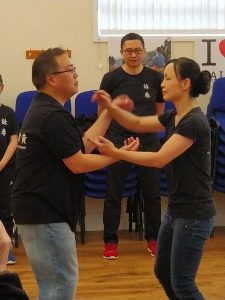
Wing Chun demonstration
A much anticipated set was the Taekwondo demonstration by Instructor Tom Delve of the Shefford Taekwondo group – he and his class showed powerful martial patterns with punches and blocks and included a display of young students which drew much appreciation from the crowd – this finally culminated in a show of brick breaking by the instructor and his senior students, which had us all urging them on and applauding.
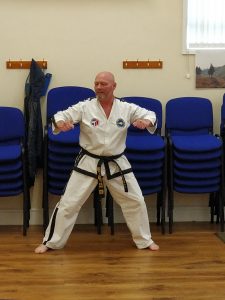
Performance of Taekwondo pattern
Ian took a further session of Tai Chi where he discussed the way that Natural Movement with relaxed good posture forms the basis for good martial techniques – taking standing exercise into walking and into light co-operative partner work. Ian demonstrated both the traditional slow hands free Tai Chi form and a brief but fast Broadsword form which he and senior students practice on Sunday evenings.
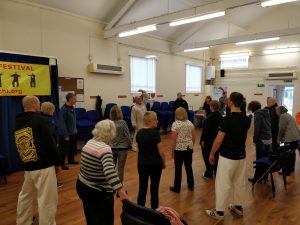
Tai Chi demo class
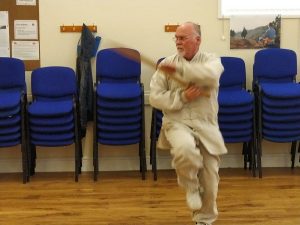
Tai Chi broad sword demonstration
No health and fitness day would be complete without a Yoga class – which was taken by teacher Rick Nunn from 9-Energy Natural Expression – even at the end of the day there were many people still up for joining in with this excellent class which proved challenging and fun. There was even a little friendly competitive spirit expressed by some of the participants who had stayed from the morning and were still looking to enjoy themselves with healthy movement. Rick’s sense of humour in this shared learning environment was appreciated by us all.
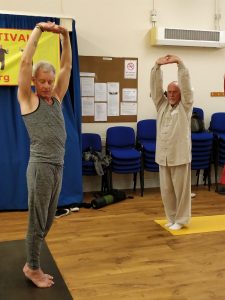
Yoga demonstration class
The day closed off with more Tai Chi from Ian who took the class through walking backwards and how it related to balance and natural movement with a little more of the martial aspect.
Home baked cakes with tea, coffee and squashes were provided free throughout the day by the Shefford Tai Chi group – with donations for charity collected at the counter which finally totalled £110 – going equally to the World Wide Fund for Nature and Hitchin homeless.

refreshments
Our grateful thanks go to the many volunteers from Shefford Tai Chi who gave their time (and cakes!) to making this annual free community event such a success.
 The Shefford Tai Chi Festival is held at Shefford Community Hall each year on World Tai Chi and Chi Kung Day designated by the World Health Organisation for the last Saturday of April. This year it will be complimented by a wider Community Festival held at venues throughout Shefford in September from 22nd to 30th. Organisations wishing to participate in either this year’s Community Festival or next year’s Tai Chi Festival should contact Ian Deavin on [email protected]
The Shefford Tai Chi Festival is held at Shefford Community Hall each year on World Tai Chi and Chi Kung Day designated by the World Health Organisation for the last Saturday of April. This year it will be complimented by a wider Community Festival held at venues throughout Shefford in September from 22nd to 30th. Organisations wishing to participate in either this year’s Community Festival or next year’s Tai Chi Festival should contact Ian Deavin on [email protected]
Contacts:
Tai Chi – Ian Deavin – 07860 218334
Jujitsu – Lee Alexander/Nicky Tribble – 07780 971004
Alexander Technique – Eileen Johnson – 07717 154732
Wing Chun – Yvoone and William Wong – 07900 922486
Taekwondo – Tom Delve – 07743 918487
Yoga – Rick Nunn – 07535 676319
Massage/Aromatherapy – Tom Rigby – 01767 314185
Shefford Library – Joy Lakin – 0300 300 8067
Shefford Community Hall – Elsa Tattersfield – 01462 811607

